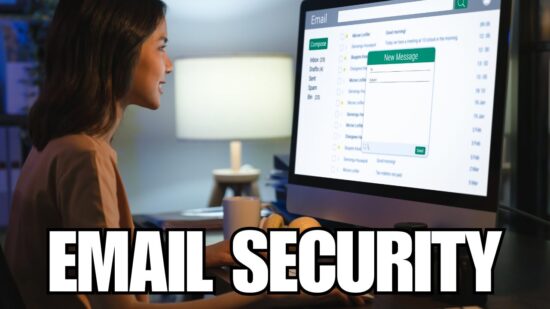Why Email Encryption Is Vital for Lawyers
Key Points:
- Cyber attacks and security breaches are rising among small to medium-sized organizations.
- Email encryption is vital in the legal industry due to the types and amount of sensitive information that lawyers and law firms handle.
- Unencrypted emails risk your client’s information and can have severe repercussions for your law firm.
Today cybersecurity is vital in every industry. Protecting intellectual property and sensitive email messages should be a priority regardless of profession. Hacked or leaked emails can have ramifications that affect your clients and your business.
Like most businesses, email has become the most common method for lawyers to exchange information with clients. No matter your profession, email encryption is a smart way to protect yourself and your clients, but it is essential for lawyers.

What Is Email Encryption?
Emails are prone to the disclosure of information. While most emails are encrypted during transmission, they are stored in plain text, leaving them vulnerable. Emails that are not encrypted are vulnerable to hackers, making the content readable by persons other than the designated recipients.
Email encryption is vital in the legal industry, with the American Bar Association dedicating an entire page of its website to the subject. As a legal professional, it’s your ethical duty to protect client information from exposure to unauthorized access.
Email encryption helps protect sensitive data your law firm handles and can be essential to compliance with regulations. Protecting your client’s personal information, and keeping all communications secure, is crucial for the clients you represent and the safety of your practice. There are several reasons why your law firm should have email encryption.
Enhanced Security
A data breach can be potentially crippling for any law firm. In addition to sensitive employee data, they must protect all client records and documents related to ongoing or closed cases.
Email encryption provides a layer of security for emails sent from or received at your law firm. Encryption of emails makes it difficult for hackers to access the content making confidential information far less vulnerable to attack. Encrypted emails are stored in an encrypted format that requires a key or password to gain access.
All sensitive data should remain encrypted, whether in transit or storage. Failing to protect sensitive information can have significant repercussions and damage your firm’s reputation.
Regulation Compliance
As a lawyer, you will encounter many different regulations during your career. In addition, new rules and regulations further complicate compliance by changing what your firm must do.
Depending on what area your firm specializes in, you might find the need to encrypt a wide array of specific information. For example, law firms often require encryption for handling personally identifiable information and other sensitive types of data or documents. Email encryption can help your law firm comply with various regulations.
While some regulations do not explicitly require encryption, they require that you protect specific data. Email encryption ensures that you exceed the minimum security requirements and potentially keeps you in compliance with future regulations and updates. Email encryption should be implemented with other security measures as part of your firm’s comprehensive security plan.
Protects Client Data
Lawyers deal with an incredible amount of email. Often email exchanges can include multiple conversations between clients, partners, and anyone else involved in a case. When you multiply that by the number of cases each lawyer and the firm are dealing with, it’s easy to understand how a lawyer’s inbox can overflow daily.
With that amount of volume, security and confidentiality can be a challenge. Email encryption effectively solves this problem by ensuring all client data sent to or from your law firm is encrypted and protected by default. Email encryption helps maintain the confidentiality of sensitive information, preventing unauthorized access or use of the data, and ensures that your client’s data remains secure.
Increased Privacy and Streamlined Communications
By using email encryption, your firm, other legal professionals, and clients are ensured of complete privacy. Email encryption protects your privacy by turning personal information into “for your eyes only” messages intended only for the parties that need them.
Encrypted emails require authentication, so only the intended recipient can read them. Email encryption also ensures that any data sent is not visible to anyone else, guaranteeing that privacy and confidentiality are maintained both within the firm and with client communications.
Email encryption also streamlines communications within your law firm, eliminating the need for paper-based documents and making sharing confidential information more efficient.
Reduced Risk Of Cyberattacks
Cyberattacks and identity theft are growing issues for every small to medium-sized organization. Cybercriminals are more frequently targeting these organizations because they are soft targets with less cyber security than large corporations. This trend will continue, and depending on your law firm’s work, it might find itself a target.
Hackers can easily intercept unencrypted emails containing driver’s license numbers, social security numbers, or other sensitive personal data from your or the recipient’s email server. Hackers target this type of data because it enables them to perform various types of identity theft. Lawyers commonly request sensitive personal information from their clients, so it’s vital to have a secure means of sending and receiving this information.
Email encryption is a proactive way to address the threat of cyberattacks and prevent your firm from becoming a victim. When encrypted emails are sent, the risk posed by malicious attacks is reduced because the data contained in the email is not accessible without the correct password or key. Email encryption ensures that confidential information in emails is safe and secure by reducing the risk of emails being intercepted or accessed by unauthorized parties.
Easy Setup
Email encryption is easy to set up and requires no specialized technical training or additional hardware. All that is needed to set up email encryption is the appropriate software, which can be quickly and easily installed. With minimal input from IT staff, your firm’s email encryption software will be set up.
Email Encryption For Lawyers
Email encryption should be integral to any law firm’s comprehensive security protocols. Email encryption can dramatically improve the safety and security of confidential and sensitive information transmitted via email and help ensure your firm complies with relevant regulations.






